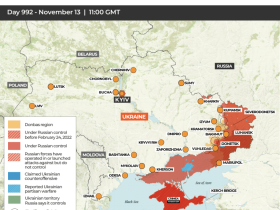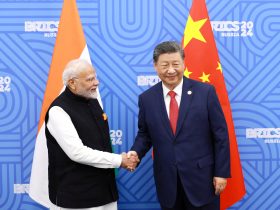
Nearly everybody in India is now susceptible to the impacts of local weather change, former chief scientist of the World Well being Organisation Dr Soumya Swaminathan has stated, underscoring the pressing want for cross-ministerial and worldwide collaboration to handle its results on well being, gender and financial stability within the nation.
Swaminathan pointed to ladies and youngsters as particularly susceptible to those climate-driven well being dangers.
In an interview with PTI on the sidelines of world local weather talks COP29 right here in Azerbaijan’s capital, Swaminathan known as for a concerted method, saying, “virtually everybody in India is now susceptible to local weather change impacts, from excessive warmth to vector-borne illnesses. Addressing this requires shut cooperation.”
“We all know that local weather change has disproportionate impacts on ladies and youngsters,” she defined, noting how ladies, significantly in rural areas, face elevated well being dangers as a result of continued reliance on stable fuels for cooking.
She emphasised that “entry to wash vitality for everybody is a precedence.”
This, she argued, wouldn’t solely cut back well being dangers related to indoor air air pollution but in addition reduce India’s carbon footprint, marking a vital step towards sustainable improvement.
Local weather-related well being dangers in India are diversified, starting from quick results corresponding to respiratory sicknesses as a result of air air pollution, to long-term points like malnutrition stemming from disrupted agricultural cycles.
Swaminathan famous that greater than 80 per cent of India’s inhabitants is now uncovered to those dangers, emphasizing that “all people is now susceptible,” from rural farmers to city migrants.
She highlighted the precise challenges confronted by the city poor, particularly migrants who dwell in peri-urban areas with insufficient housing and sanitation, which exposes them to higher dangers throughout floods and excessive climate occasions.
With well being as a central theme, Swaminathan burdened the advantages of inexperienced public transportation, an initiative she described as a “win-win resolution.”
“Carbon-neutral public transport won’t solely cut back air air pollution but in addition promote bodily exercise and thereby enhance well being,” she stated, including that lowering air pollution would positively affect public well being by curbing respiratory and cardiovascular illnesses.
She additionally highlighted that India’s city centres are hotspots for these well being points as a result of dense populations and excessive air pollution ranges.
Swaminathan known as for insurance policies that combine each well being and local weather targets, stressing that this method can drive improvement whereas constructing resilience in opposition to local weather dangers.
“If we do this form of evaluation, we will put money into actions that promote each improvement and cut back our carbon footprint,” she famous, advocating for insurance policies that prioritise “improvement with a climate-resilient focus.”
Examples of such built-in actions embody selling clear cooking fuels, enhancing entry to secure consuming water, and investing in infrastructure that may stand up to excessive climate.
Dr Swaminathan went additional to advocate for a gendered method to local weather coverage, urging policymakers to “put a highlight on ladies but in addition the poorest communities.”
She argued that gender fairness and social fairness are important to efficient local weather coverage, explaining that “by taking a gendered perspective in all insurance policies, we will guarantee extra inclusive and efficient local weather motion.”
Swaminathan known as for higher analysis on local weather impacts which might be gender-specific, noting that this information would assist policymakers create extra focused, significant interventions.
The financial prices of climate-driven well being impacts are additionally extreme.
Swaminathan pointed to current research indicating that climate-related air air pollution alone prices the worldwide financial system trillions of {dollars} yearly, affecting productiveness, agriculture, and even tourism.
“When you have a look at the GDP loss and office productiveness misplaced as a result of air air pollution, it is huge – within the trillions,” she stated. This, she argued, makes local weather motion not only a ethical crucial however an financial necessity.
Addressing air air pollution as a cross-border problem, Swaminathan famous that air pollution doesn’t recognise borders, making it essential for India and different nations to have interaction in international collaborations.
“Air air pollution at the moment is the one largest threat issue to well being,” she stated, including “It isn’t an issue one nation can remedy by itself.”
She referenced the Our Widespread Air (OCA) Fee, a worldwide effort she is a part of, which has been working with worldwide our bodies like WHO and UNEP to advertise international requirements and monitoring mechanisms for air high quality.
“We’d like a system the place each nation has air high quality screens and updates its information, together with on tremendous pollution like methane and black carbon,” Swaminathan stated, including that these pollution are extremely harmful but usually ignored.
Swaminathan additional defined the worth of native information, which she argued would give a extra correct image of air pollution’s affect on totally different areas of India.
“Policymakers wish to see information from their very own areas; it makes the difficulty actual for them and helps design native options,” she stated.
Reflecting on the invisible nature of air pollution’s well being impacts, Swaminathan commented, “When the air air pollution is seen, folks acknowledge it as an issue, however usually it is invisible, and folks change into accustomed to it.”
She burdened that whereas loss of life charges from pollution-related sicknesses are sometimes mentioned, policymakers ought to deal with the widespread persistent sicknesses brought on by poor air high quality.
“It isn’t solely about loss of life – it is about persistent unwell well being that impacts high quality of life and productiveness,” she stated, mentioning that younger kids and the aged are particularly susceptible.
For Swaminathan, tackling local weather change is basically linked to India’s improvement objectives.
“For us, improvement continues to be a key precedence,” she asserted. Whereas India has made strides in growing entry to electrical energy and clear water, she burdened that a lot work stays, particularly in rural areas the place communities lack primary infrastructure.
Her imaginative and prescient for India’s local weather adaptation entails not solely mitigating well being dangers but in addition guaranteeing that improvement initiatives – from housing to sanitation – are climate-resilient.
Swaminathan expressed optimism about India’s potential to guide in local weather adaptation by innovation, international cooperation, and dedication to sustainable improvement objectives.
She pointed to Indian cities as potential leaders in air high quality initiatives and inexperienced infrastructure, stating that “India generally is a mannequin for sustainable urbanization if we prioritize each improvement and environmental well being.”
(This story has not been edited by NDTV workers and is auto-generated from a syndicated feed.)







